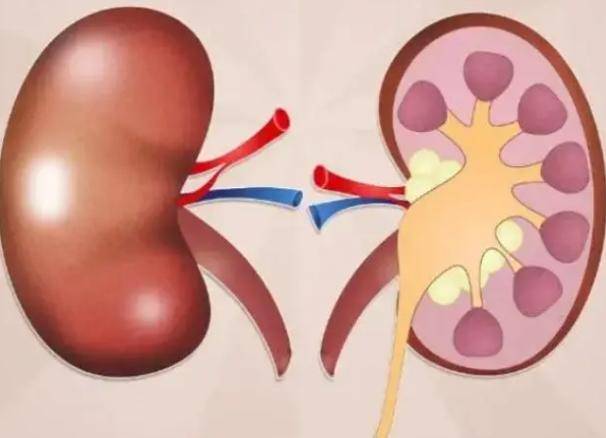The kidney is one of the vital organs in the body, responsible for detoxification and metabolism. It is closely related to endocrine balance. If there are issues with the kidneys, it can lead to edema, renal failure, uremia, and even life-threatening situations. In China, one out of every ten people suffers from chronic kidney disease, and even young people may have poor kidney health.
How important are men’s kidneys?
Maintaining the body’s electrolyte balance and physiological equilibrium primarily involves excreting toxins represented by urea nitrogen and creatinine, thus keeping creatinine levels in the blood relatively stable.
It secretes hormones, the most common being erythropoietin, which helps maintain normal levels of hemoglobin in the blood, preventing renal anemia.
Regulating certain hormones can balance calcium, potassium, sodium, and phosphorus, making the kidneys very important in maintaining the electrolyte balance in the blood.
The kidneys also provide essential substances that play a crucial role in maintaining the body within normal ranges.
5 seemingly insignificant behaviors that slowly “empty” the kidneys!
1. Holding in urine frequently
The kidneys can be affected by incorrect behaviors, such as holding in urine frequently, which poses risks of kidney damage. The correct approach when feeling the urge to urinate is to use the restroom immediately to empty the bladder. This not only helps maintain mental and physical relaxation but also protects organs like the bladder, kidneys, and prostate.
Prolonged urine retention can lead to difficulty in urination and urinary retention. Moreover, individuals who consistently hold in urine may have harmful components in the urine reabsorbed by the body, affecting organ functions. Therefore, timely urination is crucial for kidney protection.
2. Overeating
As people’s quality of life improves, dietary structures become more diverse and complex. Long-term consumption of high-protein, high-salt, and greasy foods can overload the kidneys, increase the risk of functional damage, and be detrimental to kidney health. Additionally, high-salt foods burden kidney metabolism excessively, disrupt electrolyte balance, increase blood pressure, and potentially lead to kidney diseases.
3. Inadequate water intake
Waiting until the mouth is dry before drinking water can unknowingly harm the kidneys. The kidneys’ primary function is to excrete excess water and toxins from the body. Adequate water intake helps eliminate waste effectively. Individuals who frequently lack water experience reduced circulation and metabolism, leading to toxin accumulation and potential kidney function decline. Therefore, drinking water frequently in small amounts is essential for promoting kidney health.
4. Staying up late often
Occasional late nights have minimal impact on the kidneys, but prolonged sleep deprivation significantly harms the kidneys. When the kidneys do not rest at night, metabolic waste and toxins cannot be efficiently eliminated, leading to strong-smelling urine. Men may experience kidney deficiency symptoms, anxiety, depression, irritability, and it can also affect male sexual function, causing decreased libido and erectile dysfunction.
5. Blindly using medication
Many medications in real life can damage the kidneys. Therefore, individuals with impaired renal and hepatic function should use medications cautiously. Excessive and blind use of medications that are detrimental to kidney health can lead to kidney damage.
Nutritional composition of oysters
For every 100 grams of fresh oysters, they contain 86 grams of water, 2.3 grams of ash, 5.7 grams of protein, 2.1 grams of fat, 8.2 grams of carbohydrates, 0.19 mg of riboflavin, 29 mcg of vitamin A, 488 mg of sodium, 217 mg of potassium, 7.6 mg of iron, 139 mg of calcium, 69 mg of magnesium, 9.83 mg of zinc, 0.94 mg of manganese, 1.7 mg of niacin, 8.19 mg of copper, 117 mg of phosphorus, and 89 mcg of selenium.
Can eating oysters tonify the kidneys?
Eating oysters can assist in kidney tonification, but the recovery results may vary from person to person and cannot be generalized.
Oysters belong to a shellfish category, rich in mineral elements, especially zinc, which is associated with development and male sexual function. Therefore, oysters can aid in kidney tonification, with a recommended daily intake of 100 grams, approximately 8 to 10 oysters. Oysters should be cooked before consumption, and raw consumption should be avoided.
Doctors admit: There are 4 foods truly beneficial for kidney tonification, recommended for regular consumption:
1. Black beans
Black beans are rich in plant-based protein, amino acids, and trace elements, crucial for kidney health and maintenance. Regular consumption of black beans promotes normal kidney function and helps reduce the kidney’s burden.
2. Chinese yam
With balanced properties, sweet taste, and abilities to invigorate the spleen, nourish the lungs, fortify the kidneys, and benefit essence, Chinese yam is suitable for individuals with excessive yin or unstable kidney qi leading to spermatorrhea or premature ejaculation. Chinese yam, when combined with other kidney-tonifying foods like fox nuts and lotus seeds, enhances effectiveness.
3. Black sesame seeds
Black sesame seeds contain a large amount of fat, protein, sugars, vitamins A and E, lecithin, calcium, iron, chromium, and other nutrients, beneficial for liver and kidney tonification, nourishing essence and blood, and moisturizing the intestines. Regular consumption of black sesame seeds can alleviate symptoms caused by limitations in liver and kidney essence and blood, such as dizziness, premature graying of hair, and hair loss.
4. Walnuts
Walnuts are highly nutritious, containing proteins, fats, vitamins, minerals, and other nutrients. The fatty acids and vitamin E in walnuts aid in promoting kidney metabolism and detoxification, as well as enhancing kidney immunity and resistance. Doctors recommend consuming walnuts daily in moderation to avoid excessive intake.
In conclusion, although oysters are nutritious, claims about their kidney-tonifying and aphrodisiac effects lack scientific basis. While enjoying the deliciousness of oysters, it is essential to rationalize their efficacy and avoid blind beliefs. Maintaining a balanced diet, moderate exercise, and healthy lifestyle habits are crucial for preserving overall health.


